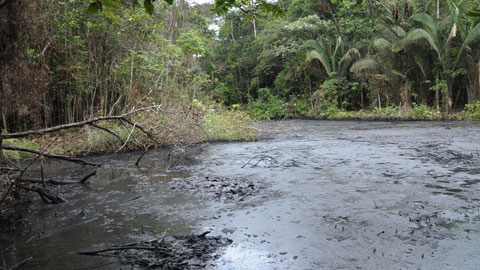Scientists denounce lack of studies on negative health effects of oil spills

26/10/2016
A total of 638 million inhabitants in developing countries live close to oil extraction sites. Despite this elevated number, the harmful effects of being exposed to the contamination caused by oil extraction to the health of people living in these areas is unknown, according to a recent study by researchers from the Institute of Environmental Science of Universitat Autònoma de Barcelona (ICTA-UAB), the Barcelona Institute for Global Health (ISGlobal) and the UAB Faculty of Veterinary Medicine.
The study, published in the journal Environmental Health, is part of a broad scientific project which has been conducted by ICTA-UAB for over a decade and which analyses the concerning levels of oil contamination existing in areas of the Peruvian Amazon very close to the border with Ecuador. The scientists criticise the fact that there is an absence of studies which can determine with precision the harmful effects these oil spills have on the indigenous population and demonstrate that the oil contamination expands thousands of kilometres of rivers, sediments and soil, thereby causing a chain of bioaccumulation of heavy metal contaminants which spans over water, fish, animals and people.
Researchers were able to verify in previous studies that in this area alone, inhabited by Quechua and Achuar societies, 1,100 kilometres of rivers are affected, representing 22% of the total; while cartographic studies conducted reveal that a total of 2.6 million barrels of oil have been spilled. This region of the Amazon rainforest was declared an environmental emergency by the Peruvian government in 2003 and a sanitary emergency in 2013, but no local registries of morbidity or mortality exist up to date. "People who are ill cannot visit the doctor or go to the hospital. They simply die and no one knows the cause", says Martí Orta, ICTA-UAB scientist who criticises that, although the adverse health effects of being exposed to oil and other derivative products are known, restorative measures or sanctions have never been applied.
According to researchers, the majority of existing studies have focused on analysing harmful effects of spills among clean-up groups, but not on the populations residing in the region, which are extremely vulnerable and exposed to contaminants for very long periods of time. "It is important to study the effects of oil derivative contamination on the people living in regions where oil is extracted, since the time and the way in which they are exposed to these substances are different. Moreover, studies conducted until now focused on workers and not on the effects produced in the part of the population which could be more vulnerable such as children, pregnant women or people with other health problems", says ISGlobal scientist Cristina O'Callaghan-Gordo. The local communities take in contaminated water and food, and are physically in contact with affected rivers and lands through bathing and daily farming tasks.
Being exposed to the oil and produced water used in the extraction process (rich in heavy metals, hydrocarbons and other radioactive elements) cause neurological and hematologic health problems and produce irritative symptoms among the population. In addition, the burning of natural gas means that individuals inhale volatile organic compounds such as nitrogen dioxide and sulfur dioxide.
The study emphasises the need to increase research into the effects of oil spills in the resident population with the aim of truly discovering the health risks associated with exposure to these elements, promote effective control policies to prevent contamination and foster public health policies dedicated to avoiding human exposure to already contaminated areas.